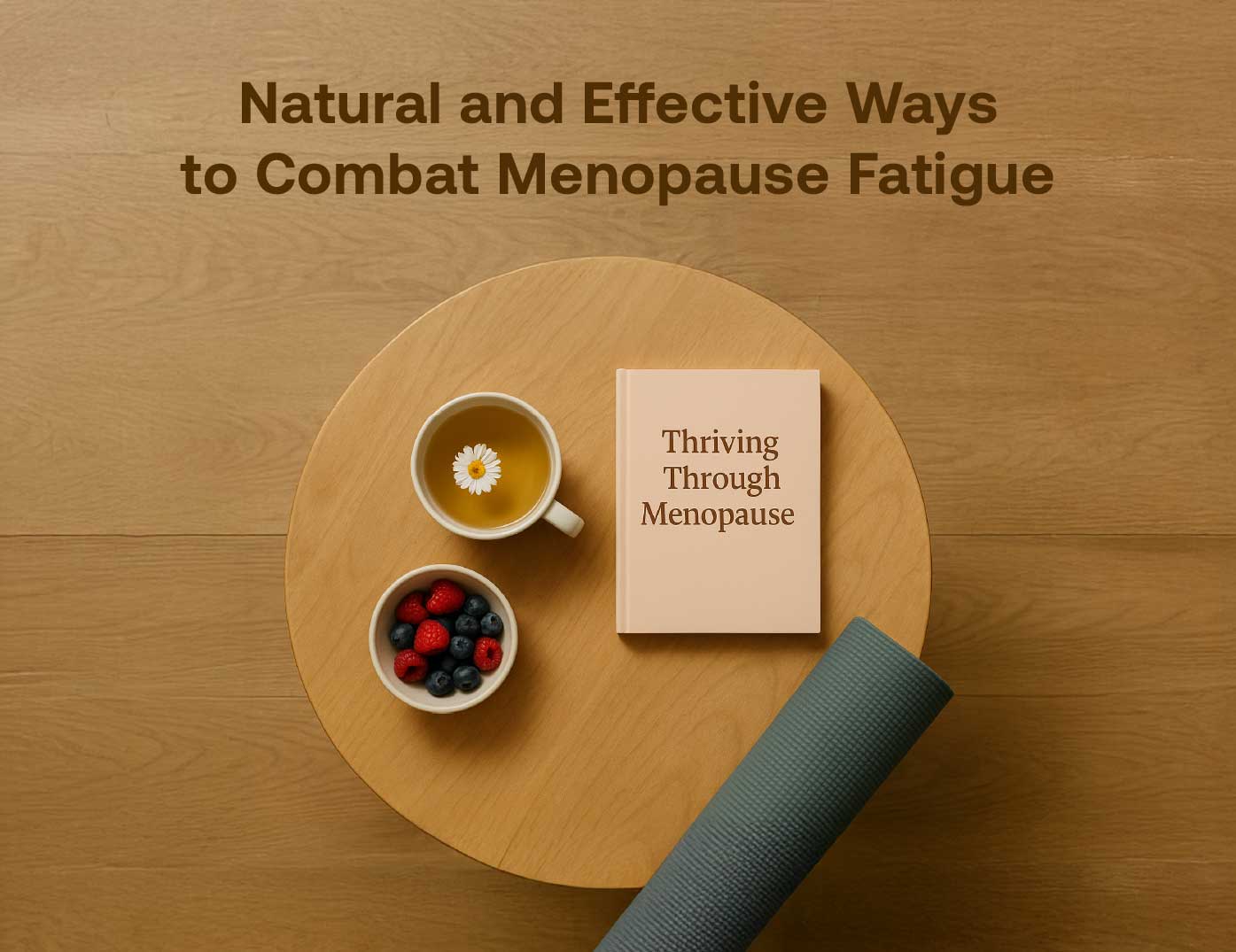Table of contents
Cycle syncing combined with detox practices offers a promising approach to enhance female well-being. By understanding the hormonal fluctuations throughout the menstrual cycle, women can align their detoxification strategies accordingly. This guide underscores why it's vital for women aged 30–45 who often experience hormonal imbalances to embrace natural cleansing methods that complement their unique physiology, thus optimizing health outcomes and fostering a deeper connection to their bodies.
Understanding Detox and the Menstrual Cycle Syncing

Detoxification and menstrual health are intricately connected through the hormonal fluctuations that characterize the menstrual cycle. The process of detoxification is essential for the elimination of waste products, including hormones, through organs like the liver and kidneys. Key hormones such as estrogen and progesterone influence both physiological regulation and detoxification pathways.
Throughout the menstrual cycle, estrogen and progesterone levels shift, impacting mood, energy, and overall metabolism. For example:
Follicular phase: Rising estrogen may improve mood and energy, encouraging natural detox habits like hydration and nutrient-rich eating.
Luteal phase: Elevated progesterone can cause mood changes and fatigue, making gentle detox approaches more appropriate to avoid imbalances like intense PMS or heavy bleeding [1] .
Supporting detoxification during menstruation is critical. Best practices include:
Eating a fiber-rich diet
Staying hydrated
Engaging in gentle movement like stretching or walking [2]
Avoiding extreme detox regimes is equally important, as they may cause nutritional stress and disrupt menstrual regularity [3]. Aligning detox with cycle phases ensures that cleansing supports, not hinders, hormonal balance.
The Hormonal Landscape of Your Menstrual Cycle

Understanding the hormonal changes during the menstrual cycle is crucial for customizing detox routines. The main hormones, estrogen and progesterone, fluctuate throughout, influencing physical and emotional well-being.
Follicular Phase (Days 1–14): Estrogen begins low but steadily increases, promoting improved mood, energy, and insulin sensitivity [4].
Ovulatory Phase (Around Day 14): Estrogen peaks while progesterone begins to rise. This surge can enhance confidence, emotional well-being, and vitality.
Luteal Phase (Days 15–28): Dominated by progesterone, this phase often brings fatigue, food cravings, and mood swings. Magnesium, fiber, and hydration can ease discomfort [5].
Menstruation: Hormone levels dip, leading to possible fatigue or cramping. Focus on replenishing nutrients with iron-rich and anti-inflammatory foods.
Throughout these phases, harmonizing detox efforts with your body's changing needs leads to a more balanced, sustainable sense of wellness.
Timing Your Cleanse for Maximum Effectiveness

To optimize detox practices, it’s beneficial to align them with specific menstrual cycle phases. The follicular and ovulatory phases are particularly conducive to effective cleansing:
Follicular Phase (Days 5–14): Rising estrogen promotes higher energy and reduced appetite, making it an ideal time for light cleanses or intermittent fasting. This enhances mood and stamina [6].
Ovulatory Phase (Days 12–18): Estrogen peaks, boosting metabolism and vitality. This is a prime window for liver-friendly foods like raw greens [7].
Avoid intensive detoxing during:
Luteal Phase: Increased appetite and fatigue make fasting hard to sustain [8].
Menstruation: Focus on iron and magnesium-rich meals to support the body’s natural repair processes.
Strategic timing can turn detox from a rigid practice into an enjoyable, effective health enhancer.
Detox Strategies Tailored to Your Cycle

Adapting your detox plan to each phase of the menstrual cycle promotes balance and maximizes benefits:
Follicular Phase: Focus on foods like fruits, greens, lean protein, and whole grains to boost liver function. Hydration and light movements, such as yoga, support natural cleansing [3].
Ovulatory Phase: Continue eating antioxidant-rich foods and staying hydrated. Incorporate mindfulness and aerobic movement to support emotional and physical detoxification [2].
Luteal Phase: Emphasize magnesium-rich foods like leafy greens and nuts. Avoid sugar and processed foods. Use gentle practices like yoga to support hormonal balance [9].
Menstrual Phase: Choose easily digestible meals (soups, steamed veggies). Herbal teas help reduce inflammation and promote rest [10].
Cycle-aware detoxing empowers you to prioritize your body’s shifting needs, promoting ongoing vitality.
Ayurvedic Wisdom for Women’s Health

Ayurveda offers a holistic framework for supporting detox and hormonal balance. It emphasizes regular elimination of toxins (ama) to restore harmony within the endocrine system:
Panchakarma: Deep-cleansing therapy that balances hormone production [11].
-
Herbs :
Triphala: Supports digestion and liver detox [12]
Shatavari: Nurtures reproductive health and eases menstrual issues [13]
Lifestyle Practices: Include yoga, meditation, and proper sleep to naturally regulate hormones [14].
This ancient system bridges physical, emotional, and spiritual health, making it a valuable complement to cycle-based detox strategies.
Expert Insights and Real-World Applications

Experts increasingly recognize the synergy between cycle syncing and detox as a practical tool for women’s hormonal wellness:
Light detox during the follicular phase helps prime the body for ovulation by promoting waste removal and energy optimization.
Many women observe improvements in cycle regularity, reduced PMS, and enhanced overall well-being after syncing their detox efforts with their menstrual phases.
Mild, whole-food-based detox practices, not aggressive cleanses, offer the most sustainable results [3].
Ultimately, the key lies in tuning into your body’s hormonal cues and adopting a supportive, flexible approach that evolves with your needs. Consulting a healthcare provider before starting any detox regimen is always advisable, especially for those with pre-existing hormonal conditions.
Relevant Products
A notable product that supports this approach is the Osh Wellness Preconception Cleanse , formulated for hormonal health through natural detox. It's tailored to complement different menstrual phases with its plant-based, nutrient-rich ingredients.
Conclusions

When detox strategies are aligned with the menstrual cycle, they become more effective, gentle, and affirming. Attuning to hormonal changes allows women to support their well-being naturally, fostering harmony and empowerment. A cycle-aware detox plan is a sustainable path toward long-term hormonal balance and vitality.
FAQs
What is the best phase of my cycle to do a detox?
The follicular and ovulatory phases are ideal due to increased energy and metabolism.
Can I detox during my menstrual cycle?
Gentle detox through hydration and nourishing foods is recommended. Avoid extreme cleanses.
How does Ayurveda support detoxification?
Ayurvedic practices like Panchakarma and herbs such as Triphala aid liver detox and hormonal balance.
What should I eat during the follicular phase?
Focus on fiber, leafy greens, lean proteins, and hydration to support estrogen rise and liver function.
Are there any risks associated with detoxing?
Yes, extreme detox plans can disrupt hormones, especially if not timed with menstrual phases. Always consult a health professional.
Sources
1: Future Woman - The Basics of Oestrogen Detox
2: Femme International - Period Health: 5 Daily Detox Tips
3: Spring Hill Wellness - Detox May Affect Your Period
4: NCBI - Menstrual Cycle Overview
5: Clue - The Menstrual Cycle: More Than Just the Period
6: The Women's Wellness Collective - Guide to Supporting Your Cycle
7: Detox Kitchen - How to Eat with Your Cycle
8: Hawaii Cleanse Co - The Best Time to Cleanse in Your Cycle
9: Health Fab - Detox While on Your Period
10: Intimina - Does Your Period Detox Your Body?
11: The Ayurvedic Clinic - Ayurvedic Practices for Hormonal Harmony
12: Vedi Herbals - Hormonal Imbalance Treatment
13: One World Ayurveda - Doshas and Hormonal Health
14: Ayuvya - Ayurvedic Medicine for Hormonal Imbalance
15: Flo Living - Detox Strategies Aligned with Your Cycle
16: Clean Program - Period Cleanse



